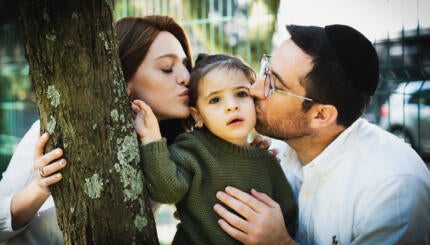What is Jewish music?
For some it is the violins of Klezmer. For others it is Leonard Bernstein. For Sarah Aroeste it is contemporary tunes in Ladino. For Reuben ‘Prodezra’ Fromey it is hip hop with Torah values.
Aroeste and Fromey have very different musical backgrounds and very different sounds. Aroeste trained in classical opera before discovering a passion for the Jewish language of her Sephardic ancestors. Now she devotes herself to creating new materials in the ancient Sephardic language of Ladino. Fromey grew up in a traditional Jewish household in the Savannah, GA. His large African American family loves music and he began his career making beats for family members. Today, he has his own approach to hip hop, bring together the sounds of his childhood with a positive message.
Theirs are not the music most often heard in American Jewish life, they are neither white nor Ashkenazi, but they are emblematic of the creative diversity that is the historic and contemporary Jewish legacy. And both have been named by The Jewish Forward as finalists for the Soundtrack of Our Spirit 2016 their music pushing the boundaries of modern Jewish music to be more inclusive of Jewish forms of expression and experience.
“For me this getting to this stage of Soundtrack of Our Spirit is exciting,” says Aroeste, “because I want to people to see that Sephardi music is more than a traditional repertoire. Ladino is a living and breathing part of Jewish culture. Jews today need to hear all the sounds that make up the Jewish culture.”
Diane Tobin, the director of Be’chol Lashon, is excited that both artists, who work with Be’chol Lashon, were selected. “Twenty percent of Jews in America are not white and Ashkenazi, and it is great to see that diversity reflected in the finalists of Soundtrack of Our Spirit,” she said. “We hope people will vote for and support their music.” The winners will be selected by popular Internet voting.
For Fromey, being selected for Soundtrack of Our Spirit means the opportunity to remind people that most of the time, “they are not getting the the full gambit of Jewish music if you only listen to Ashkenazi, Mizrachi or Sephardi music. If you broaden your listening, you have Jews of all shades and backgrounds who carry love of music with them. What makes Jewish music is not one specific sound, even though often people think it is.” Key for Fromey, an observant Jew, is the message of the music, “If it stems from Torah and the Torah message, then the music comes into the genre.”
Aroeste and Fromey are pushing the understanding of American Jewish music. Both write original material while leaning heavily into their own experiences and Jewish themes. The boom is his music draws from the particularly Southern style of hip hop which he heard growing up. But Fromey was not always as tied to a traditional Jewish life style like he is today and there were some bumpy patches. Fromey knows from experience that Torah helps people ride the roller coaster that is life. “The message of my music is faith and trust in G-d and always believing in yourself.”
Aroeste, who began singing in Ladino in college, is now the mother of two young daughters, the inspiration for many of her songs. Komo Vas the song selected for Soundtrack of Our Spirit speaks to the hopes she has for her girls. Aroeste explains, “It asks, will you grow to be kind, will you grow to be good, will you grow to be strong and will you grow to be amistoza, which is a Ladino word that means friendly, open and loving. These are the questions all parents ask for their children, but these are also the questions we should be asking the Jewish community.”
Hear Sarah Aroeste and Reuben ‘Prodezra’ Fromey’s selections for Soundtrack of Our Spirit 2016 and vote for the diversity of Jewish music.
Sephardic
Pronounced: seh-FAR-dik, Origin: Hebrew, describing Jews descending from the Jews of Spain.
Torah
Pronunced: TORE-uh, Origin: Hebrew, the Five Books of Moses.



